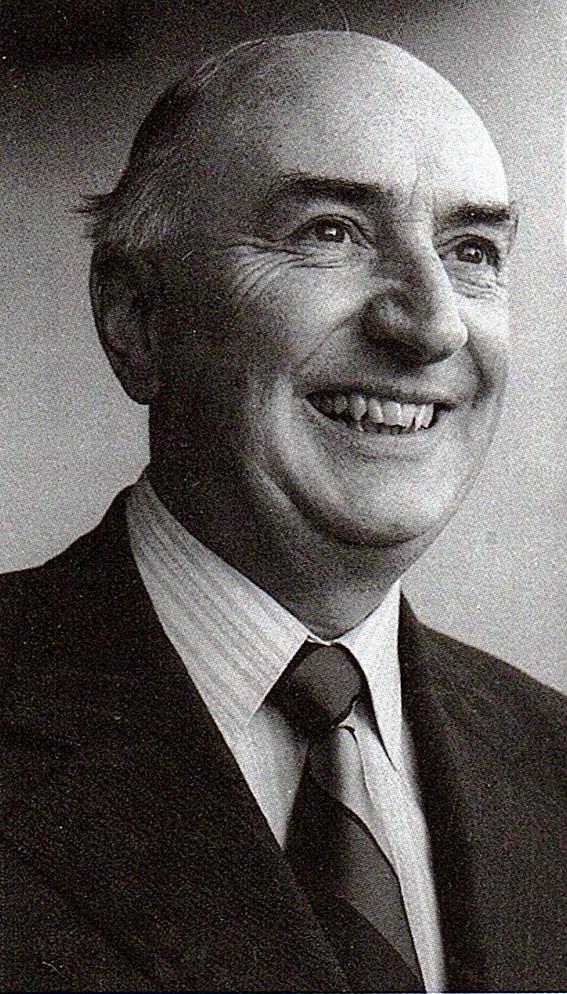ALAN BRACK, BEM – OBITUARY
Alan Brack was born on 27th March 1921 in Liverpool, the youngest of three children. He attended The Alsop Grammar School for his secondary education.
As a young man Alan, like so many of his generation and the two or three generations before his, fought for his country. He served in the RAF in the Middle East, the Sahara, Algeria, Sardinia, Italy and Palestine. In 1945 he was awarded the British Empire Medal, in recognition of meritorious military service, which he proudly showed to folk when they visited him.
 After the war Alan followed his brother, Arthur, into Her Majesty’s Customs & Excise, but found his real vocation as a writer. He first proposed the idea of a staff magazine for Customs & Excise in 1949, and kept promoting the idea until it finally happened in 1968 as Portcullis. Although Alan never edited the magazine, that would have meant leaving Wirral, he made regular contributions to it. Alan continued to read Portcullis well into his retirement until it ceased publication in 2005 when Customs & Excise merged with the Inland Revenue to form the new HM Revenue & Customs.
After the war Alan followed his brother, Arthur, into Her Majesty’s Customs & Excise, but found his real vocation as a writer. He first proposed the idea of a staff magazine for Customs & Excise in 1949, and kept promoting the idea until it finally happened in 1968 as Portcullis. Although Alan never edited the magazine, that would have meant leaving Wirral, he made regular contributions to it. Alan continued to read Portcullis well into his retirement until it ceased publication in 2005 when Customs & Excise merged with the Inland Revenue to form the new HM Revenue & Customs.
After Arthur died in December 2004, nephew Duncan Brack was able to contribute a short notice to what became the last edition of Portcullis. He remembers Alan telling him that he was surprised to read it, and wanted to know who had written it, because “it contained almost no mistakes”!
Alan wrote for many other publications, including national and local newspapers, and for over forty years, the local magazines Cheshire Life and Lancashire Life. Bill Amos, who became the editor of Lancashire Life in 1970, remembers him as ‘the magazine’s most regular, reliable and prolific freelance writer, one memorable assignment even keeping him from home all night, stranded in dense fog’. Alan wrote a regular antiques column in Cheshire Life for 18 years and when he stopped writing this he was still planning to continue writing the occasional piece in the magazine with a Wirral connection.
Alan published five books: The New Merseyside, The Wirral, Liverpool: The Official Book of the City, A Cheshire Christmas and, in 1983, All They Need is Love, which celebrated the centenary of the Liverpool Society for the Prevention of Cruelty to Children, the first such organisation of its kind in Britain and the forerunner of today’s NSPCC.
Alan also formed a team with Edith, who he married in 1950. Edith wrote a series of books on flowers and flower arranging. Alan helped her to write them and took many of the photographs for them.
By the time Alan was 68 he was involved with The Wirral Society and took over the editing of the Society’s newsletter, Wirral Matters, which he did for fifteen years. During the mid 90s he also took up the role of Minute Secretary. This he did for nine years until his retirement from the Committee in 2006. Regarding his Minutes Secretary role, Alan said in his resignation letter, that “the novelty of doing the minutes was wearing off” and that “each time I do them, the task seems harder than before”. He recalled the moment at the meeting when the request went around for someone to take the minutes, Alan said, “I was the only person that owned up to having as much as a pen and paper… and I’ve been doing them ever since!”
When he resigned from The Wirral Society Committee he handed his editing over to Judith Railton, its current editor. Judith relates that Alan could not have been more helpful, understanding and patient during the many months of the hand-over. Subsequently they liaised for several years as he continued to write a regular column for Wirral Matters on all sorts of subjects from potholes to naming roads, from the space age design proposals for Wirral Waters to humorous lines in a poem about possible new uses for Birkenhead Town Hall. There was an article about wind farms and a page dedicated to our long time chairman, Rod Tann.
Alan and Edith did not have a domestic pet but did have two wild pets that they showered their affection upon. One was a cheeky robin and the other was a hedgehog they called ‘Scuttler’. They fed Scuttler regularly and he wisely included their beautiful garden in his domain. The robin, who they simply named ‘Robin’, would come and perch on an Alan-made perch very close to the kitchen window. When they saw Robin they would put our some closely diced cheese on the conservatory window sill for him, which he clearly enjoyed.
As a fully retired couple Alan and Edith enjoyed the company and varying help from many friends. The neighbours were watchful and friends saw to their major shopping, the garden and practical problems within their home.
It was a little after Alan’s resignation from The Wirral Society that Edith began to develop dementia and gradually Alan became her full time carer. It was a very difficult period for him and after many traumas Edith passed away on 28th November, 2012. After this, as Alan now in his 90s, found he was able to reunite with his family in Sheffield on many social holiday occasions. It was here that his wit and affection was showered on the family, taking a particular joy being in the presence of his great niece Lexie and his great-great-nephews Callum and Zach.
Dislocating his right shoulder badly caused Alan a great deal of discomfort and he eventually moved into a residential home for about 18 months.
Alan was missed by his Wirral friends when he made the wise move to Sheffield to be near his niece Verity and her husband Richard. He had a very comfortable apartment. Here Verity made many visits to Alan now that he was so close and on occasions his Wirral friends also visited him.
Inevitably he steadily grew more frail, until, after a fall at home, he entered hospital in Sheffield in January, 2018 and died peacefully on the second of February, just eight weeks short of his ninety-seventh birthday.
Folk who knew him will have their own special memories of Alan. He was industrious, focussed, considerate and wise, leaving one in no doubt as to his thoughts. His hobby was his journalism from which he reaped great pleasure and we can still share in that gift when we read the books and articles he wrote. Much of his work will be donated to Birkenhead Central Library Reference Section so we shall all be able to keep in touch with him through his writings.
Alan was a man who had a lively enquiring brain, was able to sum up a situation quickly and had a wonderful skill of putting words down on paper in such a way that made it a joy to read.
He will be missed by all who knew him, not for just who he was but for his creative writing too.
David Casement